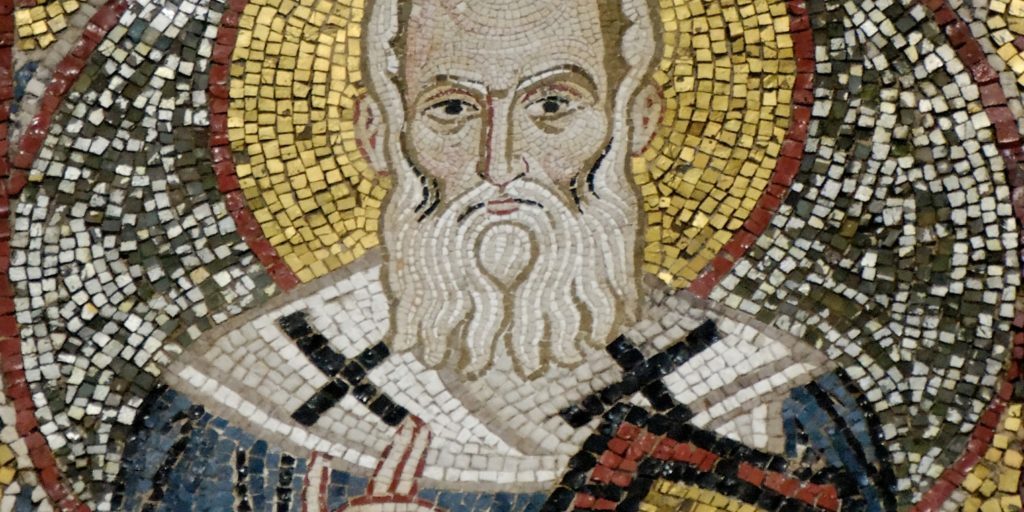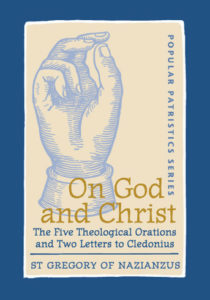
Reflections on God and Christ
Gregory of Nazianzus begins O n God and Christ by situating his readers within the context of a devastating critique “against the Eunomians.” Who were these Eunomians? According to Gregory, they were a heretical sect within early Christianity who “robbed the Son of [deity]” (89). The Eunomians enjoyed entertaining high-flung speculations about the Divine, and especially in public spaces; consequently, they turned theology into a kind of “gossip” which took place regardless of the occasion or audience (26). Against these “preposterous word-gamesters,” Gregory puts forward an approach to theology that is grounded in epistemological humility, upright speech, and godly conduct (29). In sum, Gregory believes Christians should approach theology with a stillness of heart (i.e., faith) and a willingness to quiet the storm of speculation within (i.e., humility).
n God and Christ by situating his readers within the context of a devastating critique “against the Eunomians.” Who were these Eunomians? According to Gregory, they were a heretical sect within early Christianity who “robbed the Son of [deity]” (89). The Eunomians enjoyed entertaining high-flung speculations about the Divine, and especially in public spaces; consequently, they turned theology into a kind of “gossip” which took place regardless of the occasion or audience (26). Against these “preposterous word-gamesters,” Gregory puts forward an approach to theology that is grounded in epistemological humility, upright speech, and godly conduct (29). In sum, Gregory believes Christians should approach theology with a stillness of heart (i.e., faith) and a willingness to quiet the storm of speculation within (i.e., humility).
In Oration 29, Gregory moves onward to discuss the doctrine of God. As the incorporeal, eternal One, God’s existence is made manifest through the natural order and beauty of his creation (40; 43). While God’s existence and power is “clearly seen” in creation (cf Rom 1:19-20), his “essence” remains incomprehensible (cf Rom 11:33-35).Gregory does not attempt to explain away the “divine expressions of Scripture” concerning the relations between God the Father, God the Son, and God the Spirit. On the contrary, Gregory seems quite comfortable lingering in wonder. Click To Tweet Apart from faith, the infinite God is “powerless to grasp” (47). Again, Gregory demands a theological approach rooted in the humility of faith, for faith “is what gives fullness to our understanding” (89). Moving on from there, Gregory, in Oration 30, critiques the Eunomians for their attempts to fully comprehend or explain away the mysteries inherent to God the Trinity – particularly with the Father’s ‘begetting’ of the Son.[1] Gregory contends that we should refrain from attempting to understand the exact nature of the Father’s ‘begetting,’ for we are corporeal beings trying to understand an incorporeal Being; consequently, bodily terms (such as ‘begetting’) will always fall short in sufficiently describing the eternal relations between the Persons (hypostases) of the Trinity (75-6).[2] Accordingly, Gregory does not attempt to explain away the “divine expressions of Scripture” concerning the relations between God the Father, God the Son, and God the Spirit. On the contrary, Gregory seems quite comfortable lingering in the wonder of God’s trinitarian Being.
Oration 30 is primarily concerned with the questions about the incarnation and two natures of the eternal Son, Jesus Christ. Gregory describes Jesus as “the New Adam, God passible for our sake over against sin” (93). Notice the density of Gregory’s description: as the “New Adam,” Jesus is truly human; as “God passible,” he is truly divine. Two natures, one person: this glorious reality drives Gregory onward as he explains, in so far as he can, just how the two natures come together in the one person of Christ.
Gregory shifts his focus in Oration 31 from the divinity of the Son to the divinity of the Spirit. Having set forth the Son’s “consubstantiality” with the Father, Gregory then argues for the Spirit’s “consubstantial derivation from God” (121). Drawing from Jesus’s teaching in John 15:26, Gregory argues for the Spirit’s eternal procession from the Father and the Son. The Spirit’s ‘proceeding’ is similar to the Father’s ‘begetting’ of the Son, in that the term ‘procession’ is clearly analogical in nature. Next, Gregory makes a case for the Spirit’s Godhead by regurgitating the names given to the Spirit in Scripture. Thus, Gregory includes the Spirit in his definition and understanding of God by arguing that the Spirit is of the same “essence” as Father and Son in the eternal Godhead.
Two Strengths of the Gregory’s Argument
I think Gregory’s most profound strength lies in his careful practice of theological humility. To put it simply, Gregory knew when to stop speaking and simply utter the words, “I don’t know.” The Bible itself reveals to us the limits of our knowledge about God and his divine essence – a point made abundantly clear throughout the book of Job. To put it simply, Gregory knew when to stop speaking and simply utter the words, “I don’t know.” Click To TweetNear the end of Job’s lament and despair, God pulls back the curtain and reveals himself as the infinitely wise Creator and Sustainer of all things, to which Job responds, “I have uttered what I do not understand, things too wonderful, for me, which I did not know” (Job 42:3). In a similar manner, Gregory of Nazianzus recognized [and affirmed!] the finite nature of his knowledge about God the Trinity. He understood well the limits of our language, noting multiple times the analogical nature of our God-talk (43-45; 53; 75-76; 107-108; 133-134). And, rather than leaving us with an entirely apophatic theology, Gregory lets the mystery of God’s incomprehensible nature guid him toward the wide, open pastures of biblical faith – a faith that, in the end, “gives fullness to our understanding.” Thus, Gregory’s humble faith is an oft-forgotten virtue, especially in an age where theology is dragged daily through the chaotic, disordered streets of social media.
Alongside theological humility, Gregory’s faithfulness to the language of Scripture – particularly when he speaks of the relationships between the Persons of the Trinity – is to be greatly admired by Christians seeking to be faithful to God’s revealed testimony of himself. For example, Gregory argues that the Scripture’s witness to the Spirit’s Godhead is best understood through a careful study of Scriptural language related to the Spirit. In other words, the Spirit’s relationship to the Father and the Son becomes clearer as God reveals himself across the biblical narrative – from the Spirit’s hovering over the face of the waters in Genesis to his descending in the form of a dove upon the baptized Messiah, Jesus, who, in himself, is the culmination of the Scriptures (137). Secondly, Gregory uses the language of ‘procession’ to speak of the Spirit’s Godhead. This term (procession) is taken from Jesus’s own teaching in the Gospel of John that he would send “the Spirit of truth, who proceeds from the Father” (15:26). Lastly, Gregory gathers together biblical data concerning the Spirit’s actions and titles (139-141), proving quite convincingly that the Scripture speaks clearly of the Spirit’s divinity. Altogether, Gregory remains faithful to the witness of Scripture by not going beyond the terminology given in Scripture itself. Yes, he attempts to give analogies, but he does so with a recognition that those analogies will never do justice to God’s revelation in Scripture and the Logos, Jesus.
Lighting the Biblical Path
One of the most helpful aspects of Gregory’s work – an aspect containing much contemporary relevance – lies in his exposition of Christ’s two natures. Whereas the Nicene Creed beautifully summarizes Christ’s two natures by simply reciting the narrative of the incarnation (‘he came down from heaven’), Gregory attempts to explain the how of the gospel story. By doing so, Gregory offers the Church a beautiful [and biblical] explanation of God the Son’s incarnation – his “taking on the form of a servant [and] being born in the likeness of men” (Phil 2:7).No part of our humanity was left untouched by the Son of God, for “he was subject to all that he saved.” Click To Tweet
Contrary to much of contemporary Christology, Gregory does not abandon God’s impassibility as a result of receiving the biblical doctrine of Christ’s incarnation. Rather, the incarnation is the point at which the impassible God takes on passible, human flesh “for our sake.” God “has united with himself all that lay under condemnation, in order to release it from condemnation. For all our sakes he became all that we are, sin apart – body, soul, mind, all that death pervades” (111; cf 93). In other words, no part of our humanity was left untouched by the Son of God, for “he was subject to all that he saved” (95).
How are we to conceptualize the incarnation of the impassible God? To the Gospels we go! According to Gregory, Jesus’s experiences of human pain, grief, and the like must “refer to the passible element not the immutable nature transcending suffering” (107). On the other hand, when the gospels portray Jesus doing things that only God can do, we must ascribe these actions to his impassible, divine nature. Without confusing the two, Gregory offers contemporary theology helpful guidelines for how to navigate the [seeming] tension between the [passible] human nature and [impassible] divine nature of God the Son. It also offers a strong counter-argument to the Christological heresies of our day.
At the end of the day, On God and Christ puts Nicene Christianity on full display and brings glory to each Person of the eternal Godhead. It does so by remaining faithful to the witness of Scripture and its portrayal of God as the unbegotten Father, the begotten Son, and the proceeding Spirit. Secondly, Gregory’s careful analysis of the incarnation –especially his exposition of Christ’s two natures – offers contemporary theology helpful guidelines in its attempt to accurately communicate “the faith that was once for all delivered to the saints” (Jude 1:3). Lastly, I believe that Gregory’s work succeeds in fulfilling its stated goal, namely, to “persuade all men to worship Father, Son, and Holy Spirit as the single Godhead and power, because to him belong all glory, honor, and might forever and ever.”
Endnotes
[1] While Orations 27-28 function as great primers for understanding Gregory’s theological approach and epistemological humility, Orations 29-31 do not hesitate to plunge readers into the mysterious depths of the Trinity.
[2] The same follows suit for our relational language about God as ‘Father’ and ‘Son’; these words simply describe the relationship between the Persons [not their one, eternal substance] (84).

